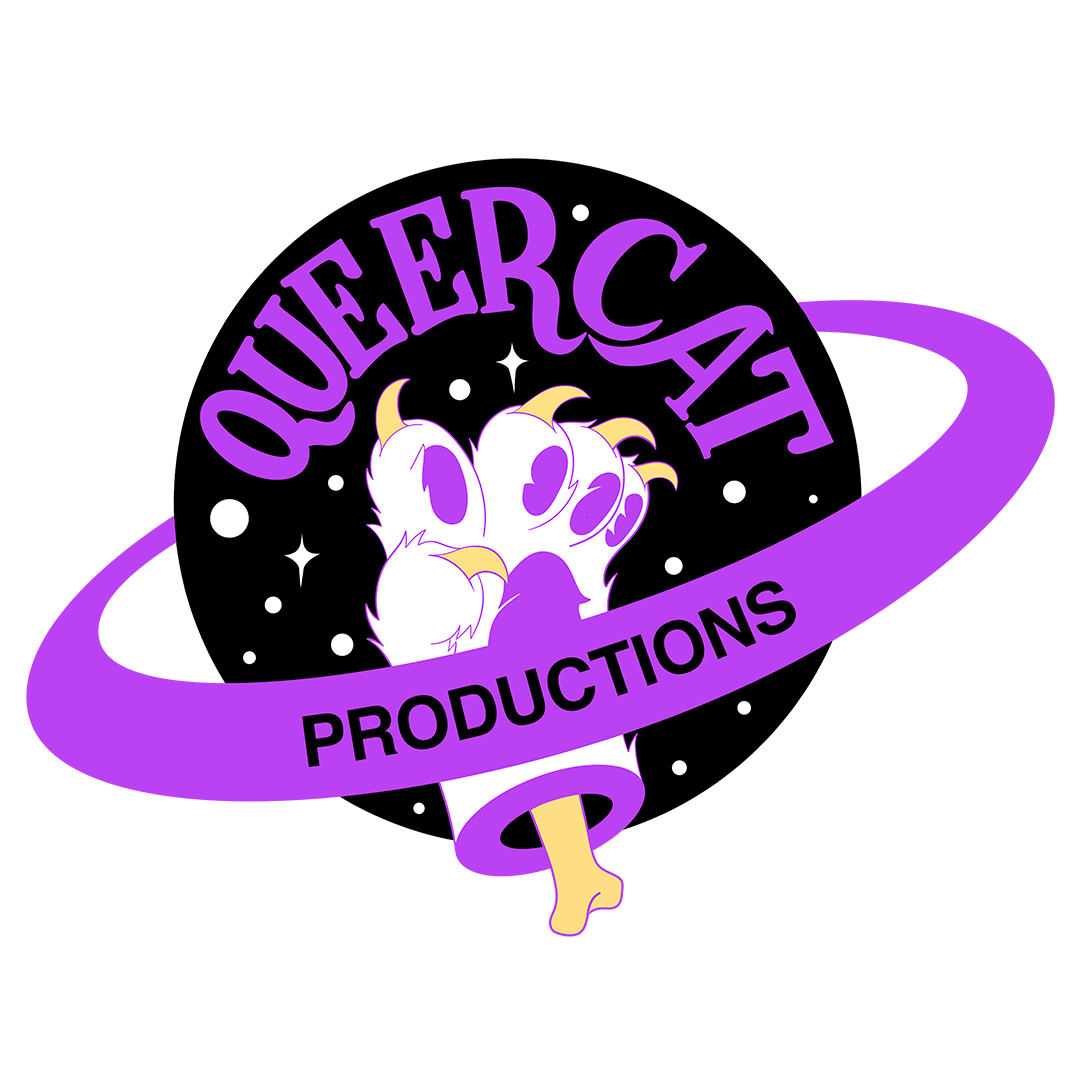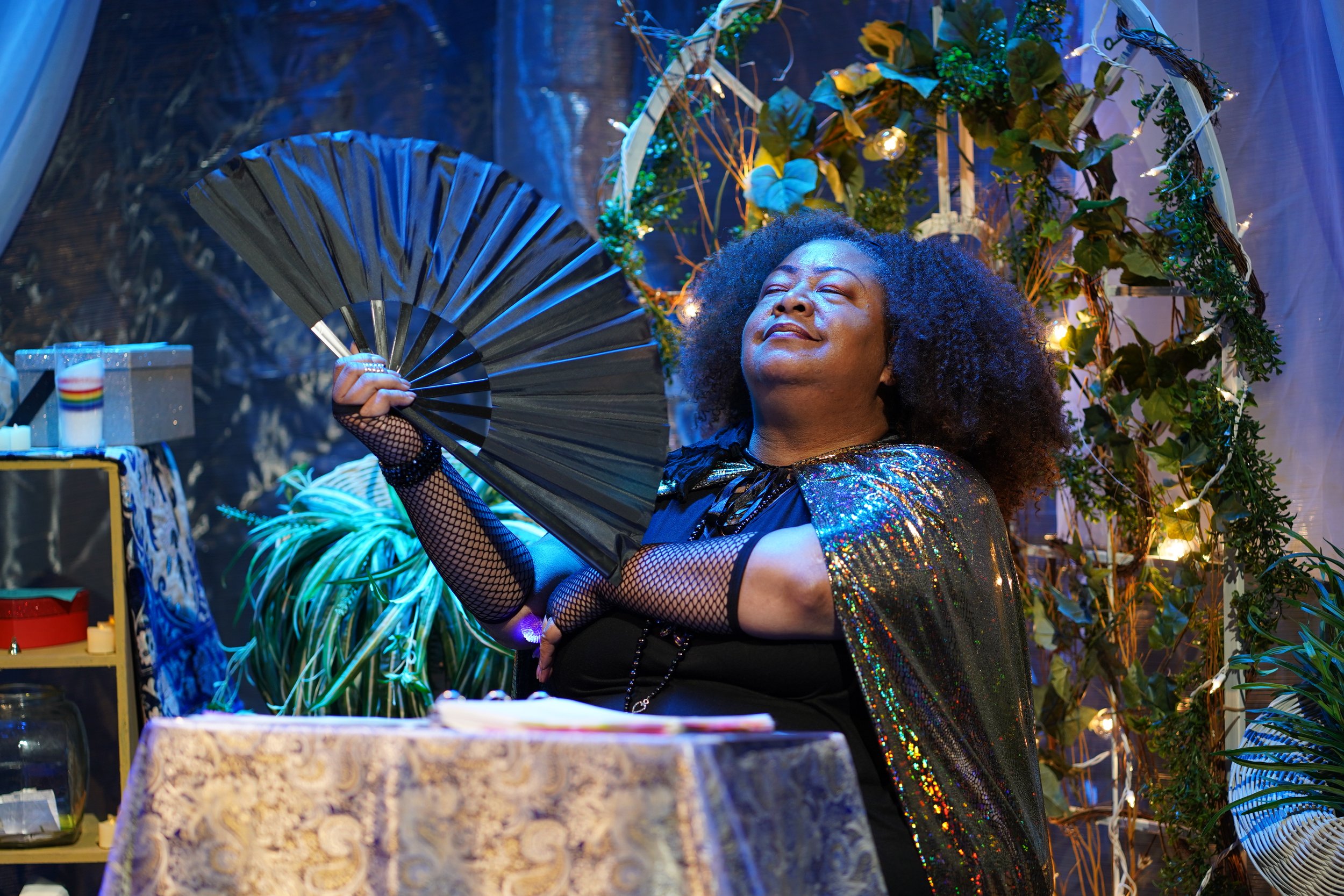
QUEER CAT PRODUCTIONS’
ACCESSIBILITY & DISABILITY JUSTICE STATEMENT
Queer Cat Productions is committed to Accessibility and Disability Justice.
This is a journey for us, and we have set our compass in alignment with the Ten Principles of Disability Justice as created and defined by Sins Invalid. We will grow into this through our vision, dream and intentions, and understanding that we will make mistakes. We appreciate and accept the guidance of internal and community feedback here. We are grateful for and honor the labor of the Disabled BIPOC leaders that have given birth to this movement.
This statement is our commitment to Accessibility and Disability Justice as a practice and process of collective liberation, in all aspects of our work, artistic creations, and how we show up in community. It is meant to be a living document to be adapted yearly as we learn and grow.
VISION/ DREAMS/ INTENTIONS
Queer Cat Productions creates consent-forward, accessible, immersive theater and experiences that leave our audiences more connected. We envision an artistic practice, process, and community that leads us to better show up for one another, fight for one another, and love one another as we build our liberated futures. You can read our whole Mission, Vision, and Values here.
We envision a space that performers, audience, producers, and community know they will not only be able to access but in which they will be welcome and safe from beginning to end.
When we use the word accessibility, we are not just speaking of providing ADA accommodations, but commitment to Disability Justice, as created and defined by Sins Invalid and the Ten Principles.
We define disability inclusively and commit to making our work and productions accessible for people who live on the wide spectrum of disability, whether this be physical impairment, chronic illness, sensory or cognitive challenges. We create processes, opportunities, and spaces for our audience and our performers to show up as their whole selves.
We are queer, trans, multicultural, disabled, neurodivergent, body diverse, AND we are still learning and growing into our understanding of Accessibility and Disability Justice. We acknowledge that this knowingness is not something that is gained overnight nor is it static. We acknowledge that we will make mistakes. And when we do, we commit to visible accountability processes with the community.
We commit to clear communication so that the burden of research does not fall on our audience and community. We commit to a back-and-forth flow of information about what can be done better.
We commit to stories and processes and workflows that honor collective belonging and evolution.
We welcome feedback, including ways we can learn and grow, at our contact form here. Feedback may be submitted anonymously.
We commit to stories and processes that redistribute care work to the collective, and acknowledge that care work could be collective and treasure the most vulnerable. Not from a place of condescension but from a place of recognizing wholeness. When we change things to be accessible for other people, they become more accessible for us as well. There is a mutual benefit to the collective.
We gratefully acknowledge the queer/trans BIPOC creators and leaders of the Disability Justice movement, including Leroy Moore, Mia Mingus, Stacey Milburn, Patty Berne, Leah Lakshmi Piepzna-Samarasinha; as well as the Black, Indigenous, and POC queer and trans leaders who have made our existence possible. We would like to extend a special thanks to India Harville of Embraced Body for her work and leadership.
REPAIR: Repair, reckoning, and
facing what we want to dismantle
We envision, and want to help bring about, a disabled future as described by Leah Lakshmi Piepzna-Samarasinha in The Future is Disabled: not just a future in which we exist, belong, and thrive, but a future created by the technology and leadership of queer, disabled, POC. Our future both personally and collectively is disabled. Our stories, survival, and liberation depend on disabled skills/knowledge/wisdom/artistry/genius. We want our work as a company and production team to reflect that future now.
Queer Cat Productions recognizes that we exist on occupied land and operate in an ableist framework. We would like to acknowledge some ways in which we have been complicit in these structures, and things we would like to change:
Operating from a narrow view of what access and accessibility could look like, such as considering wheelchair accessibility, but not a broad range of seating needs;
Operating from a disability rights perspective instead of a Disability Justice perspective; (See: Moving From Disability Rights to Disability Justice)
Unclear communication around what we can and can’t provide, and putting the burden of research on people with access needs;
Participating in theater as a historically ableist institution that has systematically created barriers to entry for both audience and artists;
Operating in a capitalist/productivity mindset within our own organization creating urgency, deadlines, overwork, and creating barriers to people with different access or caregiving needs;
Providing for access to events as an afterthought, on a case-by-case basis, instead of making accessibility and Disability Justice part of everything we do.
OUR CURRENT COMMITMENTS:
What we are doing and will continue to do
Acknowledging that we exist in bodies and centering our whole selves, specifically:
Access needs check-ins, pronoun-sharing, and individual check-ins at the top of every meeting, allowing whole people into the space;
Valuing consent as a central tenet of our work, and continuing to work on communication and transparency, to create an environment where consent and access needs can be meaningfully expressed;
Limiting our work and meeting hours, and taking Cat Naps to value rest.
Operating at venues that are wheelchair-accessible with wheelchair-accessible gender-neutral and scent-free bathrooms;
Prioritizing those most vulnerable due to chronic illness and disability, specifically, adjusting to pandemics and fire season by going fully virtual, and/or requiring masks, as needed;
Providing ASL interpretation for at least one performance of every show;
Creating a made-for-virtual performance of every show;
Posting accessibility information about our shows, including content warnings;
Opening channels of communication, both internally across the company, and externally with our community and audience, meeting those needs wherever possible, and communicating how those needs will be met;
Sliding-scale tickets;
Captions in our virtual shows;
Educating ourselves as a company about Disability Justice and Accessibility by hiring a disability consultant, and making Accessibility and Disability Justice part of our mission;
Asking artists, audience, and community about their access needs and adapting accordingly.
OUR FUTURE COMMITMENTS:
Things we will do with a specific timeline
These are the things we aim to accomplish in the next few years. We will update this annually:
2023
Providing ear plugs for audience members who are sensitive to sound;
Providing reserved seating and rows for people with disabilities and their companions;
Sanctuary areas where people who are breastfeeding or overstimulated can re-center, eventually including stimming tools;
Performing in venues with seating that fits larger and diverse bodies;
Providing seating on stage for performers, so no one needs to feel bad for having to take a seat;
Labeling on all the food.
2024 and beyond
Making Accessibility and Disability Justice a fixed and growing part of our annual budget, beginning January 2024;
Creating a hardship fund for artists as part of our community fundraisers - 2024
Working with accessibility coordinators from production inception to strike - 2024
Ramps to raised stages for performers - 2024
Having a ”what do you need” checklist on our website before an event: sharing what we offer, asking is there anything that we’ve missed? - 2024
Providing Assisted Hearing Devices - 2024 to 2025
GROWTH
We commit to continuing to learn by informing ourselves through our own personal journeys with disability, listening to the journeys of others and paying queer multi-marginalized BIPOC artists, educators, and community members for their knowledge, experience, and time.
Starting in 2023, we began paying members of various disability communities to share their experience as theater artists, leaders, and audience, to help guide our Accessibility and Disability Justice strategy and we will continue to do so.
QUEERNESS AS IN
LOVING COMMUNITY, PLAYFULNESS, JOY, COLLECTIVE LIBERATION
Learn more about our mission and values in our Catifesto!
Black, Indigenous, & POC queer and trans resistance has
made our existence possible.
Read our Commitments to Fight Anti-Blackness
I Didn’t want it to stop!
— Lily Janiak, the San Francisco Chronicle










